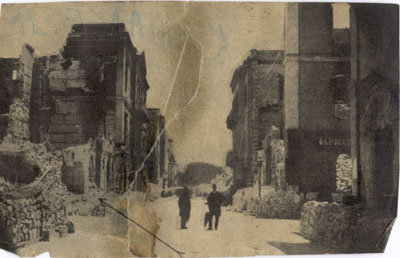Cavafy’s Life 1882–1890s
1882: The “Araby” national uprising in Egypt brings reprisals and a bombing campaign by the British colonial powers. European residents are evacuated.
 |
View of Alexandria after the British bombardment.
Photograph taken after the “Araby uprising” and bombardment in July 1882. E.L.I.A.
The scene of desolation haunts some of Cavafy’s best-known poems,
such as “Walls,” written following his return to Alexandria in 1885. |
Walls
With no consideration, no pity, no shame,
they have built walls around me, thick and high.
And now I sit here feeling hopeless.
I can’t think of anything else: this fate gnaws my mind—
because I had so much to do outside.
When they were building the walls, how could I not have noticed!
But I never heard the builders, not a sound.
Imperceptibly they have closed me off from the outside world.
Trans. Edmund Keeley and Philip Sherrard
|
|
1882–1885: Harikleia leaves Alexandria for Constantinople with her youngest sons. Cavafy loves Constantinople and sets to work writing. Of his first extant poems, two are in English, one in Greek. He keeps a diary and a notebook, both in English. “Constantinopoliad, an Epic” includes observations on the family’s decline, colonial Egypt, historiography, and readings in history. The notebook contains “Genealogical gossip or Various bits of the History of our Father’s and Mother’s family thrown together.” In a letter dated 12 August 1884 (Cavafy Archive, S.N.L.) brother John Cavafy writes from Alexandria to Constantine in Constantinople expressing great admiration for “the kindliness of your good heart, . . . the nobleness and rectitude of your sentiments, . . . the generosity of your character” as well as impatience “for that happy moment that will bring us two together. ‘Arcades ambo’ . . . .” John also reveals “intense satisfaction . . . in how masterly a fashion you wield the pen.. . . you have style.”
1885–91: Return to Alexandria. Cavafy works as a journalist (1886), a broker in the cotton stock exchange (1888), and finally as an unpaid secretary in the Irrigation Service (1889). A senior official reportedly finds him “showing so much intelligence and working diligently so that I do not know how the work in the office would be done without him.”
1889–1891: Untimely deaths of Cavafy’s close friend Mikes Rallis (1889) and his brother Peter (1891).
1892: Cavafy is offered a salaried position as clerk in the Ministry of Public Works and will remain there for 30 years. He despises his job deeply, but does his work meticulously.
1891–1899: Cavafy begins to complete and publish poems. In 1891 he completes “Builders,” several prose works, and an editorial advocating the return to Greece of the Elgin Marbles. Some of his best-known poems follow: “Candles,” “The City,” “Voices,” “An Old Man,” “Chandelier,” “Walls,” “Windows,” “Waiting for the Barbarians,” “Che fece . . . il Gran Rifiuto,” “The First Step.”
|
|
|